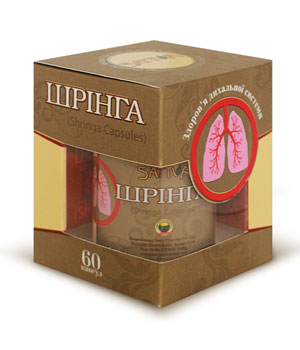Health Problems
Subscribe Newsletter
SUPPORT FOR THE HEALTH OF THE RESPIRATORY SYSTEM
Shringa Capsules
60 Vegetarian Capsules
Excessive accumulation of ama (mucus) is the most important causal factor of respiratory diseases. Ama is sticky, foul-smelling toxic material, which is formed as a result of a weak digestive fire (agni). When ama enters the respiratory system, it produce an excessive amount of mucus, which interferes when breathing.
Problems of the respiratory system:
Running nose - caused by Rhino virus. It is localized in the nose and throat, causing frequent sneezing, runny nose, cough, headache, body aches, etc. It is an infectious disease.
Sinusitis – is an inflammation of the mucous membrane in one or more sinuses - air spaces in the facial bones that communicate with the nose.
Whooping cough – is a bacterial infection caused by the bacterium Bordetella. It begins with an inflammation of the nasal mucosa, sneezing, watery eyes, and irritation in the throat, fever and severe coughing. Whooping cough produces large amounts of thick mucus. Strong and frequent cough accompanies pertussis throughout the disease.
Allergy – is a kind of immunological response of the body to the allergen. When the body reacts to allergens such as pollen, plant spores, dust, chemicals, pharmaceuticals or any other substances that cause irritation, allergy occurs in humans. People suffer from sneezing, runny nose, cough and itching.
Bronchitis – is an inflammation of the bronchial tubes. Bronchitis bronchial walls become inflamed and swollen, and the amount of mucus increases. The airways constrict and expel mucus becomes difficult. Difficult breathing and lungs do not get the required amount of oxygen. This leads to increase of temperature, dyspnea, and loss of appetite.
Asthma - is a manifested cough, cramps, attacks of breathlessness and wheezing. It is characterized by the presence of airway obstruction. This condition may occur as a result of frequent respiratory diseases. Asthma can be caused by an allergy to the weather, food, drugs, dust, smoke, perfumes and other irritants. Heredity, psychological factors, stress and anxiety can also cause asthma. In a fit of asthma bronchial smooth muscle are narrowed, and the tissue lining the airways swell from inflammation and secrete mucus.
Pleurisy - is an inflammation of the pleural wall lining of the lungs. This causes pain in the chest cavity during inhalation and exhalation. Pleura, or pleural walls, are bilayer membranes designed to protect the lungs. When pleurisy layers become inflamed it rubs against each other during breathing and the person feels extremely uncomfortable. In severe conditions, even the pain felt during movement of the chest and not only during breathing.
Effect of the Medicine Sattva Shringa capsules
Plants present in Sattva Shringa capsules are traditionally used for coughs and asthma problems. They help in reducing the inflammation of the bronchioles, are useful in chronic cough and have anti-inflammatory properties. They are also useful in pleurisy (inflammation of the pleura), colds, laryngitis, sore throat, bronchitis, cough and to eliminate the relief of pain in his chest. The advantages of these plants are highly valued in Ayurveda since ancient times. They contribute to the dilution of thick bronchial secretions and sputum discharge when coughing, reduce airway inflammation.
Benefits
- It is useful for all kinds of cough, regardless of whether it is dry or wet.
- It can be used for the prevention of respiratory diseases, including asthma.
- It eliminates excessive thirst and burning sensation in extremities.
- Can be prescribed in the treatment of tuberculosis.
- Effective for coughs associated with bronchitis or pneumonia.
- Supports the body by allergic and viral respiratory diseases
- It is a natural and safe antitussive for prolonged use in all age groups.
Ayurvedic approach
According to Ayurveda, though channels of the respiratory system, moves the streams of vital energy - Prana. Exposure to dust, smoke, wind and cold are important causal factors for respiratory discomfort. Ayurveda also believes that the state of the respiratory system depends on the state of mind, the quality of metabolic and excretory function. Thus, mental stress can cause respiratory disease, such as asthma. Ayurveda focuses on strengthening the immune system.
The main ingredients of Sattva Shringa capsules
Tulsi - Holy Basil (Osimum sanctum) is one of the most famous plants of Ayurveda, is used in many formulations. Tulsi is used for thousands of years as one of the famous medicinal plants with great healing power. The power of Tulsi is manifested in both the physical and the spiritual plane.
Tulsi – is a perennial or shrub from Lamiaceae family originally from India. Leaves - green or purple, flowers - white, with a purple tinge. For therapeutic purposes, the leaves and stems are used. The plant comprises a high percentage of essential oil, camphor, ursolic acid, calcium and phosphorus.
It shows strong antiseptic and antibacterial properties due to the content in the essential oil eugenol and a range of other active substances. It is used to prevent and treat headaches, heart disease, various inflammations, poisoning, and malaria. Cleaning and disinfecting effect of Tulsi is also reflected in the higher plane - it is believed that this plant purifies the human aura. Tulsi shows diaphoretic and antipyretic effect, effectively removes mucus from the nasal passages and lungs. Has antispasmodic action. It also Improves the absorption of nutrients. It has antitumor and radioprotective properties. Strengthens the nervous tissue, reduces stress, and acts as an antidepressant. It improves memory. It is an antioxidant and immune-modulator. It is a Good expectorant and is used in colds, coughs and bronchitis.
Lavanga - Clove (Syzygium aromaticum) - clove buds are used in chronic cough. Lavang is analgesic with anti-bacterial, anti-viral, anti-fungal, antiseptic effect. It has anti-inflammatory, antispasmodic, antiemetic properties. It is a good Antioxidant. It is a diaphoretic, carminative, expectorant and invigorating. It Stimulates the mucous membrane of the bronchi.
Clove is an effective means to stimulate aromatic lung and stomach. It dispels cold and disinfects the lymphatic system. It has a strong warming effect.
Murati - Licorice (Glycyrrhiza glabra) - Murathi or licorice. A Perennial herbaceous plant of the legume family. In the East, the use of licorice is known since ancient times, it was used to preserve youth. In the Middle Ages, licorice root is referred to in the medical literature of all countries. For the preparation of medicines roots and rhizomes are used. They contain coumarins, polysaccharides saponozidy, flavonoids, glycyrrhizin, bitterness and essential oil. Have anti-inflammatory and emollient properties, improve memory. Active ingredients help to reduce cholesterol levels in the blood, normalization of metabolic processes in the body. It is very useful for diabetic patients suffering from dementia and Alzheimer's disease. Is used as an expectorant, relieves chest pain and is useful in asthma.
Twak - Cinnamon (Cinnamomum zeylanicum) - due to the presence of essential oils, it is effective for cough and cold. Cinnamon improves blood circulation, increases the potency, and warms the kidneys.
Vrihati (Solanum indicum) – it is useful in eliminating inflammation and remove phlegm from the bronchial tubes. Used in the treatment of asthma, bronchitis, and cough.
Vanshlochan (Bambusa arundinacea) - the inside of the bamboo - is the most valuable tool for the treatment of respiratory diseases, bronchitis, asthma and tuberculosis, as it effectively thins mucus. It relieves cough and bronchospasm in asthma.
Vasak (Adhatoda vasica) – it is useful in the treatment of bronchitis, tuberculosis and other diseases of the respiratory system. It eliminates cough, throat irritation and other symptoms of a cold. Is used as an expectorant, helps to eliminate the mucus in the airways.
Pippali (Piper longum) –it contain alkaloids piperine and piperidine, thanks to which it is widely used in the traditional practice of treating respiratory diseases. It has antipyretic properties. Effectively removes mucus from the bronchial-pulmonary system.
Shunti (Zingiber officinale) - controls the cough, eliminates phlegm, stops bleeding and facilitates bronchospasm.
Shringa Basma (Ash of Shring) - the best tonic in Ayurveda for lungs. It reduces congestion in the lungs, shortness of breath easier. Widely used in pneumonia and strokes.
Rajat Basma (Ash of Silver) –the perfect anti-inflammatory, antibacterial properties. Inhibits pathogens.
Suvarna Basma (Ash of Gold) - best in Ayurveda used to restore and strengthen the body. used in the the preparations to recover the respiratory system and to increases vitality. it Has sustained tonic effect.
Diet and Lifestyle
Do not use cold water and soft drinks, heavy and fried foods. Do not use products that lead to allergies and foods with a sour taste. Useful: brown rice, barley, honey, garlic, lemon, grapes, cardamom, goat's milk. Avoid smoke and dust. Avoid heavy physical exertion.
Ingredients
Tulsi (Ocimum Sanctum), Lavang (Syzygium Aromaticum), Murathi (Glycyrrhiza Glabra), Vrihati (Solanum Indicum), Vanshlochan (Bambusa Arundinacea), Tvak (Cinnamomum zeylanicum), Vasaka (Adhatoda Vasica), Pippli (Piper Longum), Sunthi (Zingiber Officinale), Shring Bhasma (Ash of Shring), Rajat Bhasma (Ash of Silver), Suvarna Bhasma (Ash of Gold).
Dosage
Take 1-2 capsules 2 times per day after meal, preferably with a glass of warm water.
Indications
Cough and cold, excessive discharge from the nose, shortness of breath, bronchitis, pleurisy, allergic rhinitis, sinusitis, chronic cough, shortness of breath, asthma.
Contradiction
Individual intolerance to one or more ingredients of the formula.
Packing
60 vegetarian capsules weighing 600 mg ± 10% each in food grade plastic bottle.
Storage
Store in cool dry place, protected from moisture and light. Store at 15-30° C.

